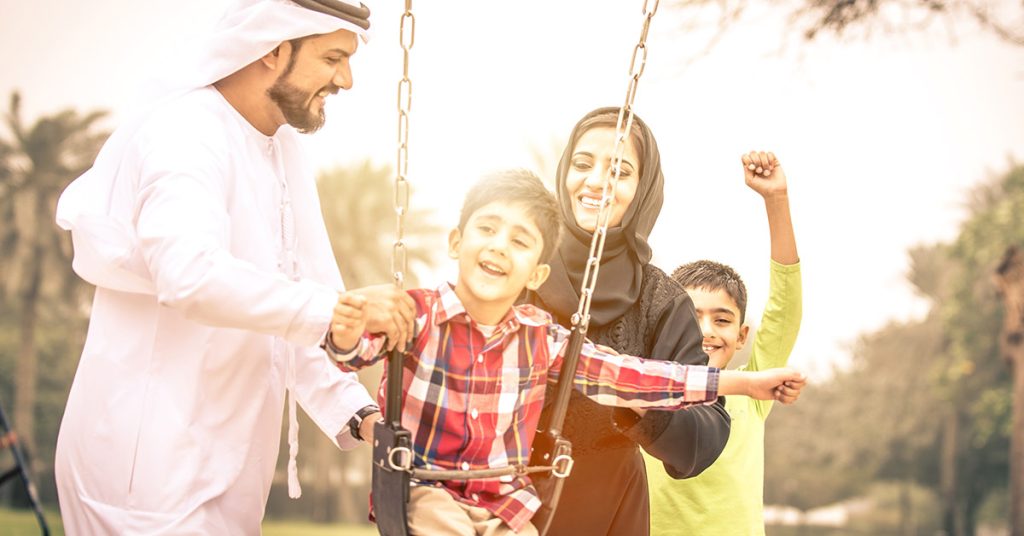In many cultures, including Arabic culture, community plays a significant role in the lives of individuals. The sense of community is deeply rooted in Arabic traditions and values, with a strong emphasis on family, generosity, and virtue. This article will explore how community, with its unique cultural aspects such as habits, family values, generosity, virtues, and the importance of welcoming others, can contribute to happiness and personal strength.
Family as the Foundation of an Arab Community
Family is considered the cornerstone of Arab society and plays a crucial role in shaping individuals’ lives. In Arabic culture, family ties are often strong, and extended family members play an important role in each other’s lives. Family gatherings, shared meals, and celebrations are cherished events where bonds are reinforced, and relationships are nurtured.
The concept of filial piety, or respect for parents and elders, is deeply ingrained in Arabic culture. Children are taught to honor and obey their parents, and parents are expected to provide guidance, support, and care for their children throughout their lives. This strong sense of family creates a support system that provides emotional, social, and practical assistance, which can contribute to happiness and well-being.
Arabic Habits that Foster Community
Arabic culture is rich in habits that foster a sense of community and promote happiness. One such habit is the tradition of gathering for meals. Sharing meals with family, friends, and neighbors is seen as an essential way to connect and bond with others. Meals are often a time for lively conversations, laughter, and the enjoyment of delicious food. The act of sharing food creates a sense of unity and togetherness, strengthening relationships and building community bonds.
Another habit that promotes community in the Arab world is the tradition of welcoming guests. In the Arab culture, guests are considered a blessing, and welcoming them is seen as a virtue. Arabic households are known for their warm hospitality, and guests are often treated with utmost generosity and kindness. This practice fosters a sense of community by creating an inclusive and welcoming environment where everyone feels valued and respected.
“Karam”: The Virtue of Generosity in the Arab Culture
Generosity, or “karam,” is a fundamental virtue in Arabic culture that promotes community and happiness. Karam encompasses the act of giving generously, both materially and emotionally, without expecting anything in return. It is seen as a noble act that reflects a person’s kindness, compassion, and willingness to help others.
In Arabic culture, karam is deeply ingrained in everyday life. It is common for people to share their resources, such as food, money, and time, with those in need. Giving to charity, or “sadaqah,” is also an important practice in Islam, which encourages Muslims to donate a portion of their wealth to those less fortunate. The act of giving not only benefits the recipient but also brings joy and satisfaction to the giver, contributing to their sense of happiness and fulfillment.
Muslim Virtues that Promote Community
Islam, the predominant religion in Arabic culture, promotes virtues that are closely related to community and happiness. For example, “sabr,” or patience, is considered a virtue that helps individuals navigate challenges and difficulties with resilience and grace. Patience allows individuals to persevere through tough times and maintain a positive outlook, which can contribute to their well-being and strengthen their relationships with others.
Another virtue emphasized in Islam is “rahma,” or compassion. Compassion involves showing empathy, understanding, and kindness towards others, especially those in need. It encourages individuals to be considerate and supportive of one another, fostering a sense of community and solidarity. Practicing virtues such as patience, compassion, and empathy can create a harmonious and supportive community where individuals feel valued and respected.
Welcoming Others into the Community
In the Arab culture, welcoming others into the community is an essential practice that promotes happiness and strengthens relationships. The act of welcoming newcomers, whether they are immigrants, visitors, or new neighbors, creates a sense of inclusivity and acceptance. It also allows individuals to learn from different perspectives, cultures, and traditions, enriching their lives and broadening their horizons.
Welcoming others into the community can take many forms, such as inviting them to share a meal, helping them settle into their new home, or showing them around the local area. These gestures of kindness and hospitality can create a positive first impression and help newcomers feel comfortable and welcomed.
Building Stronger Communities
Community is more than just a physical location or a group of people who happen to live in the same area. It is a shared experience of belonging, support, and connectedness. Building stronger communities requires intentional efforts to create an environment where everyone feels valued, respected, and included.
One way to build stronger communities is to encourage volunteerism and community service. Volunteering allows individuals to give back to their community and contribute to a greater cause. It also provides opportunities to connect with others who share similar values and passions, strengthening community bonds and promoting happiness.
Another way to build stronger communities is to create spaces for social interaction and connection. This can involve organizing community events, such as festivals, fairs, or concerts, where people can come together and celebrate their shared culture and traditions. It can also involve creating spaces for people to connect with one another, such as community centers, libraries, or parks.
Conclusion
Community plays a vital role in Arabic culture and can contribute to happiness and personal strength. The importance of family, the emphasis on karam, the practice of Muslim virtues, and the tradition of welcoming others are all aspects of Arabic culture that foster community and promote well-being. By intentionally building stronger communities through acts of kindness, generosity, and social connection, individuals can create a sense of belonging and support that can enrich their lives and contribute to their happiness.



